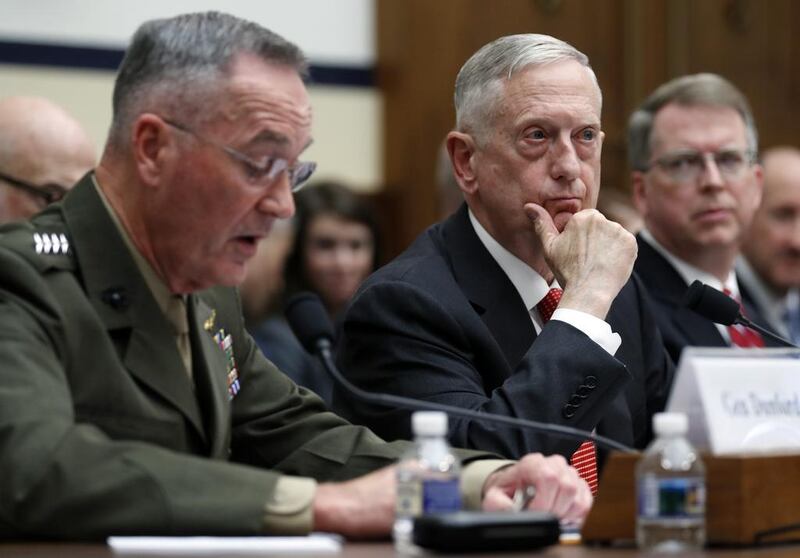WASHINGTON // The United States is not winning in Afghanistan, defence secretary Jim Mattis told Congress on Tuesday, saying he was crafting a new strategy to present to legislators by mid-July.
“We are not winning in Afghanistan right now. And we will correct this as soon as possible,” he said in testimony to the Senate armed services committee.
Mr Mattis said he would present options on Afghanistan to president Donald Trump “very soon”, adding that the strategy will take a regional approach rather than looking at Afghanistan in isolation.
American military officials acknowledge the situation in Afghanistan is at stalemate almost 16 years after the war started, and it has deteriorated in recent months. A lorry bomb explosion in Kabul last month killed more than 150 people, making it the deadliest attack in the Afghan capital since the ousting of the Taliban in 2001.
In some cases, Afghan security forces have been forced to abandon the more scattered and rural bases, and the government can claim to control or influence only 57 per cent of the country, according to US military estimates made earlier this year.
Mr Mattis has already told the House of Representatives armed services committee that he intends to take a “a regional approach” to Afghanistan and developing the new strategy would involve various US government agencies.
At the same hearing, the chairman of the joint chiefs of staff, General Joseph Dunford, said he had gone to Mr Mattis and Mr Trump with “some options that might be considered” in order to help improve the security situation in Afghanistan.
Reuters reported in late April that Mr Trump’s administration was reviewing operations in Afghanistan and there was discussion about sending between 3,000 and 5,000 US and coalition troops there.
Deliberations include giving more authority to forces on the ground and taking more aggressive action against Taliban fighters. That could allow American advisers to work with Afghan troops below the corps level, potentially putting them closer to fighting, a US official said.
Some US officials questioned the benefit of sending more troops to Afghanistan because any politically acceptable number would not be enough to turn the tide, much less create stability and security. To date, more than 2,300 Americans have been — the latest only three days ago, when an Afghan soldier opened fire on three US soldiers ineastern Afghanistan. The number of wounded tops 17,000.
Mr Mattis has also declared himself “shocked” by the state of the US military’s readiness, blaming legal budget caps and the grind of 16 years of constant war.
He said limits on military spending — effected in the Obama era and known as sequestration — have left troops at greater risk and blocked important new programmes, even though the defence budget is already greater than that of the next seven countries combined.
“I retired from military service three months after sequestration took effect,” Mr Mattis, a former Marine general, told the House armed services committee. “Four years later, I returned to the department [of defence], and I have been shocked by what I’ve seen about our readiness to fight ... No enemy in the field has done more to harm the readiness of our military than sequestration.”
Long campaigns such as Afghanistan meant equipment wore out sooner, he said.
Mr Mattis also warned that North Korea poses the most urgent threat to international peace and security, calling the regime’s weapons programme a “clear and present danger” to all.
In his proposed budget for 2018, president Trump wants to slash state department spending but significantly boost the Pentagon’s vast budget, although it falls short of the historic spending bonanza that more hawkish Republicans would like.
The Pentagon has called for US$574 billion (Dh2.1 trillion) in general defence funding, with an additional $65 billion for supplemental wartime spending — making for a total of $639 billion.
That represents a more than $50 billion increase — about 10 per cent — over 2017 funding levels for the base budget, although it amounts to only about three per cent over projections previously envisioned by the Obama administration.
* Reuters and Agence France-Presse





